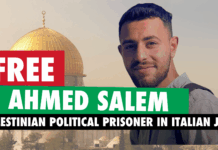The following article is translated from Arabic. It is written by Leena Jawabreh, former Palestinian political prisoner in Israeli jails. Leena Jawabreh served four years in Israeli prisons until her release on July 16, 2008. She was again arrested on August 15, 2013 along with Myassar Atyani and Linan Abu Ghoulmeh and sentenced to one month in prison and a 1000 NIS fine. She has organized multiple actions and solidarity hunger strikes in support of Palestinian prisoners, in particular women prisoners.
This article addresses the experience of Palestinian women prisoners from the author’s personal knowledge.
Facing imprisonment in Israeli Jails: A Palestinian Woman’s Testimony
By Leena Jawabreh, former political prisoner
 From the first moment of arrest, a Palestinian prisoner finds herself held in the Israeli interrogation centres, often located in military bases or settlements. Here begins the stage of steadfastness and a fierce psychological battle between the prisoner, who is disarmed of all tools of defence except her strong will, and the occupation. The dark Israeli interrogation cells are referred to, by Palestinian prisoners, as the “graves of the living underground.” Prisoners held there do not know night from day. The cells are completely closed off, with a noxious musty and damp odor, high humidity, and very dim yellow lighting.
From the first moment of arrest, a Palestinian prisoner finds herself held in the Israeli interrogation centres, often located in military bases or settlements. Here begins the stage of steadfastness and a fierce psychological battle between the prisoner, who is disarmed of all tools of defence except her strong will, and the occupation. The dark Israeli interrogation cells are referred to, by Palestinian prisoners, as the “graves of the living underground.” Prisoners held there do not know night from day. The cells are completely closed off, with a noxious musty and damp odor, high humidity, and very dim yellow lighting.
From the first moment that she arrives in such a place, her captors shackle her arms and legs to an iron chair – and this is when the interrogation begins. Interrogation usually includes physical force; threats of arrests of members of her family: her mother, father, brother or sister; constant shouting; stress positions on an iron chair; sleep deprivation; and denying her access to personal hygiene, including forbidding her from using the washrooms.
Interrogation methods and tools are many, and among them is the polygraph. It is worth noting that it is the recognized right of the prisoner to refuse questioning on the polygraph. Interrogation periods can be extended multiple times by the occupation authority, and lawyer visits denied.
This stage of steadfastness is followed by charges or a detention order, a court date, and transfer from the interrogation centre to another prison where another constant struggle begins for her: confronting racism and oppression by the prison administration.
Medical Negligence
The occupation exercises deliberate medical neglect in the treatment of Palestinian prisoners. They often do not receive treatment for their illnesses and suffering. Even when it is clear that a prisoner urgently needs to enter the hospital, her request is often, almost always, rejected. Instead, she is given only painkillers and water to treat her pain, illness or disease. On multiple occasions, prisoners have been given incorrect medicines with lasting and negative side effects. The prison authority does not allow specialist doctors to enter with the International Committee of the Red Cross, to examine the prisoner, or to give her a proper diagnosis, tests, imaging or treatment.
 In cases where a prisoner is allowed to enter the hospital after her situation deteriorates further, she is chained in the transport to the hospital by her arms and legs and her medical files are hidden from her so that she is not informed about her own medical condition.
In cases where a prisoner is allowed to enter the hospital after her situation deteriorates further, she is chained in the transport to the hospital by her arms and legs and her medical files are hidden from her so that she is not informed about her own medical condition.
Visitation
The families of the prisoners are often banned from visiting on the pretext of security. The occupation forbids prisoners from seeing her family and loved ones; this is part and parcel of the psychological coercion. The denial of family visits is an attempt to break the will of the prisoner and prevent her from communicating with the outside world and deny her contact with her family for long periods of time. This policy has particularly impacted prisoners from Gaza.
Prisoners are regularly subject to strip searches by jailers when they are being visited, or when they are going to court.
In the visitation room itself, there is a glass wall separating her from her family members, or iron bars with only small holes, and sometimes telephones for communicating with her family, which are constantly monitored by the prison authority. The prisoners are also prevented from touching or coming close to members of their family despite being only inches away.
Internal conditions
As for the living conditions in the prison cells themselves, they are very small cells with only one window that is constantly closed from the outside with metal bars. Sun and air does not enter the rooms, which are very humid, particularly in summer and often infested with rats and stinging or biting insects. The rooms do not exceed three meters in length and six prisoners or more are held in each cell. She is also often forbidden from bringing winter clothes to protect her from the freezing cold of winter inside the prison.
The occupation prison administration often punishes the prisoner without warning. She is fined and prevented from using recreation time, which is the only time that prisoners are outside their cells, or denied family visits, or held in solitary confinement. The solitary confinement cells are isolated from the rest of the prisoners’ sections and isolated in every sense of the word, not only from her family but from her fellow prisoners.
She is transferred in the “Bosta”, the designated vehicle to transfer prisoners to the military courts. It is in fact a mobile cell with a metal chair. It can barely accommodate one person in a sitting position, and the windows are blacked out. The prisoner is chained by her hands and feet, and the shackles hurt her wrists every time she moves and leave marks on her body. The Bosta is used without any mercy from the occupation. She is subjected to all kinds of humiliation, verbal abuse, and mockery by the soldiers who transport her.
We, women Palestinian prisoners, call on the people of the world to support our struggle, to demand our rights and our freedom. We demand to be treated as prisoners of war with our rights fully recognized under the Geneva Conventions. We know that we are prisoners of freedom, because we are committed to the freedom of our Palestinian land and people. The Palestinian, Arab and international voices calling for our rights and our freedom break through the darkness of the interrogation cells, the cruelty of soldiers and guards, and the injustice of the prison. We call upon you to make our case, the case of the Palestinian prisoners, an international imperative for justice and freedom.
Discover more from Samidoun: Palestinian Prisoner Solidarity Network
Subscribe to get the latest posts sent to your email.




